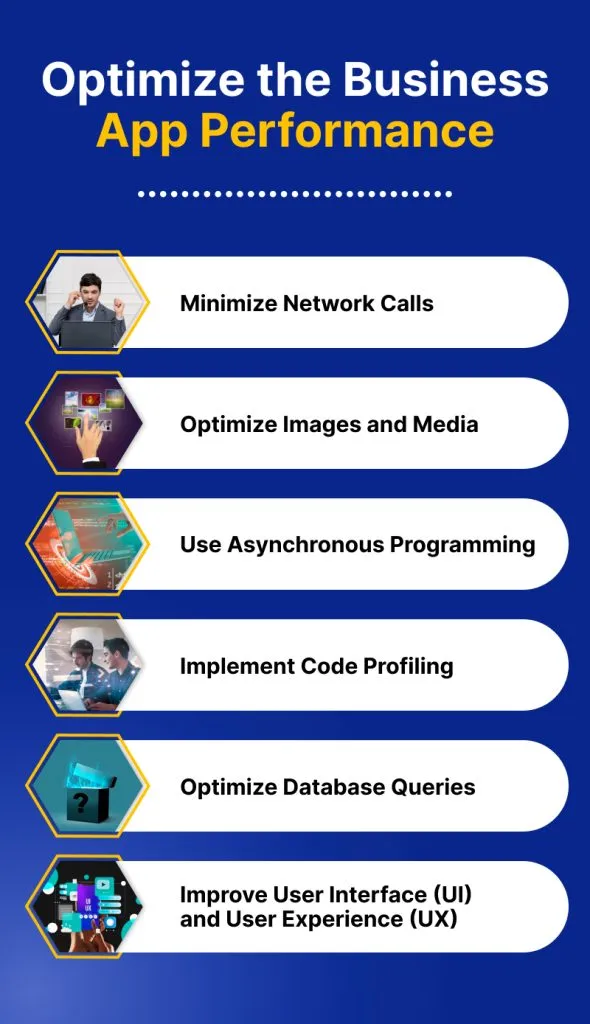As per a report published by MarketsandMarkets, the global cross-platform development market is expected to rise from USD 11.4 billion in 2020 to USD 43.1 billion by 2025 at a Compound Annual Growth Rate (CAGR) of 30.9% during the forecast period.
This growth is fueled by the rising dependence of people on smartphones for their everyday tasks, leading to a surge in demand for cross-platform mobile app development. As more businesses offer mobile app development services, they have the opportunity to scale their operations.
To help you unlock the potential of your cross-platform mobile app, this blog post will discuss essential strategies to master. We’ll cover the entire app development process, from design to marketing and promotion, to show you how to get the most out of your project.
Strategy #1: Designing For Performance
Cross-platform mobile app development companies should optimize each platform’s code. All third-party services should be tested against each platform’s environment as part of the development process.
To improve the design & performance, check the loading time & optimization of all images used within the cross-platform mobile app. This will surely improve the performance of the application.
APIs used in the cross-platform app should be compatible with each platform, as your business will grow in the future; your mobile app should be compatible with all the platforms.
This will help you avoid future costly updates and support you in scaling your business.
Experience seamless app development across all platforms with our expert team of cross-platform developers
Strategy #2: Performance Testing For Business Applications
The following strategy is to optimize your cross-platform mobile app by testing performance for business applications. Performance testing should be an integral part of any successful development project, which goes doubly when developing multi-platform solutions that must run smoothly on multiple devices.
For custom cross-platform mobile apps, performance tests help identify issues that go unnoticed until the application is released into production. Thus, businesses can ensure a smoother user experience across all platforms.
With performance tests, developers can identify bottlenecks and further optimize their application code to improve the overall user experience on all platforms. This can go a long way in ensuring users have a great experience when using your multi-platform solution.
To gain maximum insight into how well an application performs, it is advisable to use API Development Services, as this can provide invaluable data about where improvements can be made.
Also Read: Flutter Vs React Native Vs Xamarin – Top Cross Platform Mobile App Development Frameworks
Types of Performance Testing Suitable For Business Apps
Performance testing of business applications is essential in the platform development process and critical for ensuring high-quality user experiences. Here are some of the types of performance testing suitable for business apps:
Load Testing
It ensures the application can manage multiple concurrent users and large amounts of data. It tests to check how long it takes for pages to load and whether the system can handle large transactions and other operations without crashing or slowing down.
Stress Testing
This testing assesses how an application would respond under abnormally high loads like multiple users executing a complex transaction simultaneously. This type of performance helps detect potential scalability problems before they become more significant challenges.
Usability Testing
This testing evaluates how easy it is for the users to finish the tasks with your application. It analyzes the speed of the performance and the transaction delivered to the users.
Looking to unlock the full potential of your cross-platform app? Then you won’t want to miss this informative video!
Functionality Testing
As the name suggests, functionality testing ensures that all the application features work properly as expected. This type of performance test is especially important when launching new features or making changes to existing ones.
Volume Testing
This testing checks if the application can handle extensive data. It measures if the application performs well if there are a lot of records in the database and supports detecting the issues that may arise when the data expands.
Spike Testing
This type of performance testing involves simulating sudden spikes in user traffic to determine how an application will perform under an unexpected load. It helps to identify any performance issues that may occur when user traffic spikes unexpectedly, such as during a marketing campaign or a product launch.
Configuration Testing
It’s a type of performance testing that involves testing an application under different configurations, like different hardware or software configurations. It helps identify configuration-related performance issues and ensures the application performs consistently across different configurations.
These are just some of the types of performance testing that are suitable for business applications. Hire Full Stack Developers with experience in performance testing to ensure your application functions optimally and delivers a great user experience.
Experience seamless app development across all platforms with our expert team of cross-platform developers
Performance Testing Tools Suitable For Business Applications
Performance testing is one of the most critical aspects of mobile app development. It can make or break your cross-platform mobile app’s success.
If you’re looking for the best performance testing tools to use for your business applications, here are some of the most popular and effective ones that you should consider:
LoadRunner
This comprehensive performance testing tool from HP can be used for testing a wide range of applications, including those developed with Cross-Platform app development. It offers easy integration with other HP products, robust analysis, and customizable reports.
BlazeMeter
BlazeMeter offers advanced capabilities for load and stress testing. It has powerful analytics capabilities that allow you to monitor and analyze the performance of your apps on multiple platforms.
Apptim
Apptim is a cloud-based performance testing solution that allows you to test your app’s behavior in various scenarios and devices. It supports manual and automated testing, making it an ideal choice for mobile app development services.
Neotys
Neotys offers advanced performance testing solutions for mobile and web applications. It offers comprehensive support for monitoring the performance of mobile applications across various devices, platforms, and networks.
AppThwack
AppThwack provides an end-to-end platform for testing mobile apps across various devices and operating systems. Its intuitive web interface lets you easily manage and analyze your real-time performance tests.
Apache JMeter
Apache JMeter is a popular open-source tool that can be used for load testing, stress testing, and performance testing. It can simulate a large number of users and transactions and has support for a variety of protocols and technologies.
Gatling
It is an open-source performance testing tool designed to test modern web applications. It supports HTTP, WebSockets, and JMS protocols and can be used for load and stress testing. Consider hiring a dedicated software development team to utilize this tool efficiently.
Using the right cross-platform frameworks & performance testing tools ensures your business applications perform well on all devices and platforms.
Mobile app development services that use these tools are more likely to deliver better results and ensure a positive user experience. Cross-Platform app development companies that employ performance testing techniques will gain a competitive edge in the market.
More To Explore: From Idea To Launch: The Ultimate Guide To App Development
Strategy #3: Optimizing Business App Performance
Optimizing business app performance is essential to ensure customer satisfaction and drive revenues. One of the best ways to do this is to use cross-platform mobile app development and application migration & modernization services.
These services allow you to leverage the best of existing technologies to create the best cross-platform apps for your business. By leveraging such services, you can migrate existing applications to the latest version and utilize modern features, ensuring faster delivery and optimal performance.
The development of cross-platform apps should include a series of rigorous tests which can detect any bugs or issues that impede performance.
Before releasing a new app version, this testing should also be done to identify and rectify any discrepancies before they affect customers.
By conducting tests regularly and optimizing accordingly, businesses can ensure that their apps perform optimally and give customers a good experience. Optimizing business app performance is essential for ensuring customer satisfaction and driving revenues.
Experience seamless app development across all platforms with our expert team of cross-platform developers
Best Practices for Cross-Platform App Performance Optimization for Businesses
Developing a cross-platform mobile application can be an extremely complex process, with performance being one of the most critical aspects of the development. You should follow certain best practices to maximize your Cross-Platform app’s performance.
Let’s look at some of them:
1. Use a Native Development Framework
Using a native framework like React Native or Flutter is the most optimal way to develop a cross-platform mobile app. These frameworks allow you to write code once and deploy it across multiple platforms, drastically reducing development time and effort.
Explore More: Why Choose Flutter For Cross Platform Mobile App Development?
2. Optimize App Size
One common issue for cross-platform mobile app development is the size. Remember that your app’s size will significantly affect its download times and user experience. Try to optimize your resources by removing redundant data and reducing image sizes.
3. Minimize Network Requests
Network requests affect your cross-platform app’s performance. When developing your app, try to minimize external requests by using caching and local storage solutions whenever possible.
4. Maintenance Services
SAMS should be implemented to ensure the smooth functioning of the app on multiple platforms. Software application maintenance services can help you with regular maintenance & bug-fixing measures and make it more manageable when utilizing SAMS.
5. Use Hardware Acceleration
Another critical aspect of improving the performance of cross-platform apps is taking advantage of device-specific features like hardware acceleration. This allows developers to utilize device-specific technologies to make their apps faster and more efficient.
Utilizing cross-platform frameworks to leverage these capabilities will enable skilled developers to take full advantage of device-specific features without coding them separately for each platform. Adopting these strategies and practices can help your business create the best cross-platform apps.
Expert Advice for Cross-Platform App Performance Optimization
So, what’s the expert advice?
Well, the performance of any custom cross-platform mobile application is a crucial factor for its success. An effective strategy must be implemented to ensure that your cross-platform app runs optimally and without issues.
Here is some expert advice on how to optimize the performance of your cross-platform app:
1. Keep It Simple
Cross-platform apps can be complex with multiple layers, so keeping the design clean and straightforward is essential. This will reduce complexity, improving user experience and load time.
2. Leverage Native Features
Take advantage of device-specific features such as camera, GPS, Bluetooth, or push notifications which can be integrated into your cross-platform app easily.
3. Invest In Good User Interface Design
Good user interface design helps reduce clutter which can impact user experience and cause delays during page loading or navigating the app.
4. Utilize Cloud Services
Cloud services can help minimize the memory consumption of your cross-platform app by storing data remotely, improving response times.
5. Test & Refine Continuously
Regularly test your cross-platform mobile app on different devices to look for any irregularities or glitches before releasing it into a production environment.
Refining processes should be done regularly to ensure the user experience is not compromised when making improvements.
Conclusion
To sum up, the strategies discussed in this blog post are just a few of the many available but are powerful enough to help you improve the performance of your cross-platform app.
Investing in the services of experienced developers specializing in cross-platform application development is best. With the right strategies, your business can unlock the full potential of its Cross-Platform App.
Hiring dedicated software development teams ensure that your app performance optimization is done correctly and is up to industry standards.







